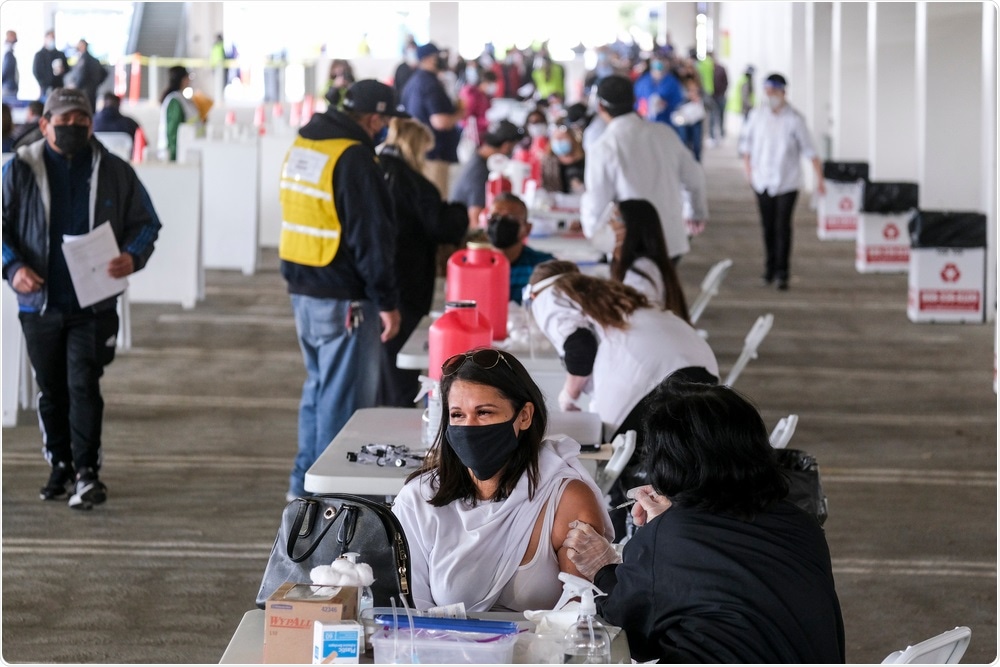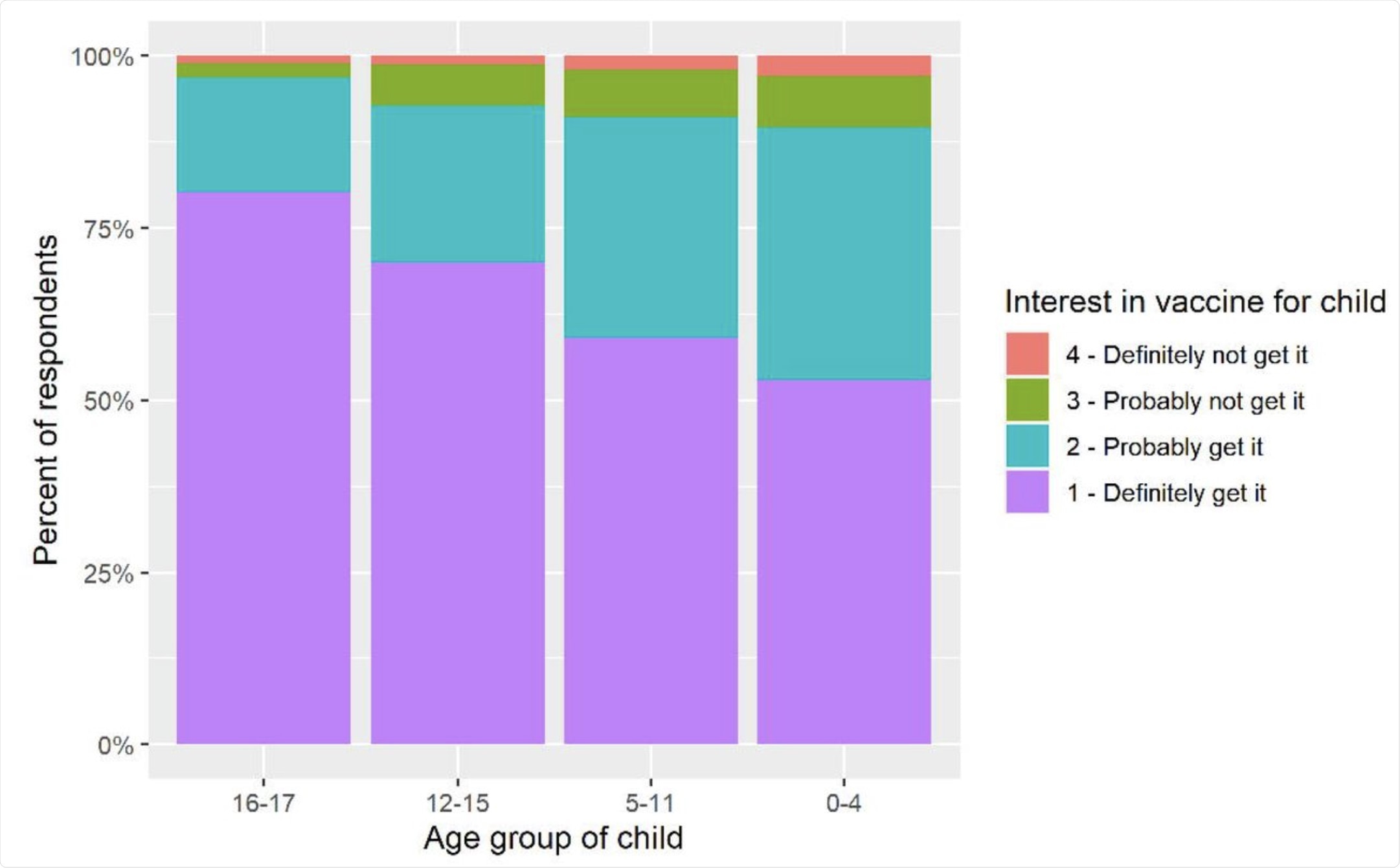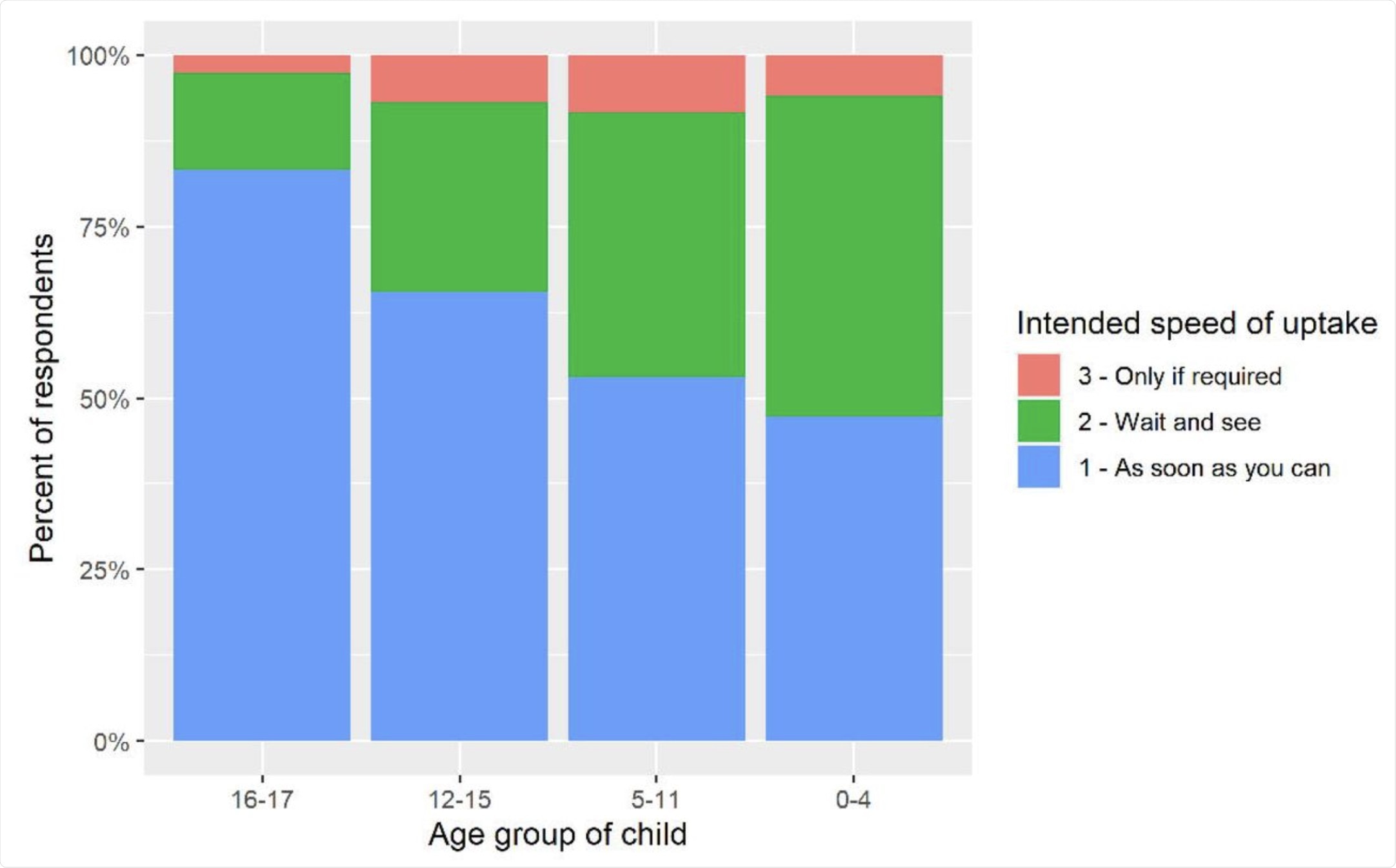The researchers also found that doctors and community organizers were the main sources of information for the parents on both COVID-19 and available vaccines. These individuals were also regarded as trusted sources of information among vaccine-hesitant parents.
 Study: High parental vaccine motivation at a neighborhood-based vaccine and testing site serving a predominantly Latinx community. Image Credit: Ringo Chiu / Shutterstock.com
Study: High parental vaccine motivation at a neighborhood-based vaccine and testing site serving a predominantly Latinx community. Image Credit: Ringo Chiu / Shutterstock.com

 This news article was a review of a preliminary scientific report that had not undergone peer-review at the time of publication. Since its initial publication, the scientific report has now been peer reviewed and accepted for publication in a Scientific Journal. Links to the preliminary and peer-reviewed reports are available in the Sources section at the bottom of this article. View Sources
This news article was a review of a preliminary scientific report that had not undergone peer-review at the time of publication. Since its initial publication, the scientific report has now been peer reviewed and accepted for publication in a Scientific Journal. Links to the preliminary and peer-reviewed reports are available in the Sources section at the bottom of this article. View Sources
Background
California has been a state with high rates of COVID-19, which is a disease caused by the severe acute respiratory syndrome coronavirus 2 (SARS-CoV-2). Within California, the Latinx community has been disproportionately affected by COVID-19.
The vulnerability of the California Latinx population to COVID-19 is likely due to the high percentage of frontline workers in this population, thus increasing their exposure risk to SARS-CoV-2. To address this increased risk of contracting COVID-19, neighborhood centers that offer both COVID-19 testing and vaccinations have been set up in these communities.
One of the main goals of these neighborhood centers is to broaden access to the vaccine, as well as build greater rapport by making use of local, Latinx-friendly staff drawn from the same community. In doing so, public health experts hope to achieve a higher vaccination rate in this high-risk group and, eventually, develop a more effective approach to extend vaccination to children under the age of 12 once the vaccine is approved.
Study details
The current study examined parental attitudes to vaccinating children at an outdoor site for testing and vaccination that primarily draws Latinx people from the community in San Francisco, California. The center was set up by a partnership called Unidos en Salud, which consists of the community (Latino Task Force), as well as several academic institutions (University of California San Francisco (UCSF0, UC (University of California) Berkeley, and Chan-Zuckerberg Biohub), and the San Francisco Department of Public Health.
This collaborative effort has offered free testing and vaccination for COVID-19 since April 2020 and January 2021, respectively, tailoring its appeal to the local Latinx community with reduced barriers for accessing its services. Children between the ages of 12 and 15 have been offered vaccination starting May 16, 2021, with over 22,000 doses that have been delivered as of June 4, 2021.
Of these doses, over 70% were given to Latinx people, and over 60% to those with a low household income of less than $50,000. For the purposes of the current study, all adults who came in for testing or vaccination were asked if they had children and, if so, their age groups, and whether they would allow those aged 12-15 years to take the vaccine.
Of the nearly 2,000 parents with children below the age of 18 years, over half participated in the survey, of whom 76% or 788 were Latinx. Of these individuals, 79% reported living in San Francisco, with 28% residing near the vaccination site. Taken together, 9% of the participants reported that one or more of their children had already got COVID-19.
What did the study find?
The researchers reported that the participants’ motivation for vaccinating their children was very high, with about 90% of parents reporting that they would vaccinate their children. The highest percentage of 97% was among those with children aged 16-17 years. Among those with very young children between the ages of 0 and 4 years, 90% indicated their willingness to vaccinate their children. Additionally, 91-93% of parents with children aged 5-15 years stated their intention to vaccinate their children.
Among motivated parents, 65% of parents with children aged 12-15 years stated that they would get their child vaccinated as soon as possible. Comparably, 83% of vaccine-motivated parents with children between the ages of 16 and 17 years also said they would seek an approved vaccine for their child in the near future.
 Vaccine interest among parents with children in each age group (16-17, 12-15, 5-11, and 0-4 years).
Vaccine interest among parents with children in each age group (16-17, 12-15, 5-11, and 0-4 years).
Despite the fact that the parents of younger children were vaccine-motivated, they reported lower rates of seeking vaccination for their children right away. More specifically, 47% and 53% of vaccine-motivated parents with children between the ages of 0-4 and 5-11, respectively, stated they would seek immediate vaccination.
Some of the different reasons that were provided for why these parents were motivated to vaccinate their children included protecting their children, keeping infections down in the community, preventing infections of adults in the family, and vaccine requirements in childcare facilities or schools.
 Intended speed of vaccine uptake for children among vaccine motivated parents.
Intended speed of vaccine uptake for children among vaccine motivated parents.
Why vaccine hesitancy?
Only about 8% of study participants expressed vaccine hesitancy. Parents who were not motivated to vaccinate their children cited fear of short-term or long-term effects, at 60% and 41%, respectively. Among vaccine-hesitant parents, 19% reported concerns that the vaccine would affect their child’s fertility, whereas 8% believed that vaccination was unnecessary because severe disease was unlikely in the child.
Overall, vaccine-hesitant parents reported lower levels of trust in all information sources. However, 50% of these individuals indicated trust for community-based groups, whereas 80% indicated that they trusted doctors' advice.
In this cohort, Latinx and non-Latinx parents showed similar rates of vaccine acceptance.
What are the implications?
In this community center-based study, over 90% of parents indicated that they would vaccinate their children. These parents were primarily motivated to vaccinate their children to prevent the spread of the virus to both their children and their community.
While earlier surveys have shown that between 26%-47% of Latinx parents are vaccine-hesitant, the results of the current study differ substantially. This is likely due to the different settings where the survey was conducted. It was an in-person survey that took advantage of a long-term favorable relationship between the community and the healthcare providers.
Many patients at the community center had no primary healthcare provider and did not speak English. However, the center had physicians who spoke both Spanish and English and would enroll any patient who wished into a healthcare facility for future care as needed.
“Both Latinx and non-Latinx parents were highly motivated to vaccinate their children, expressing low rates of vaccine hesitancy overall.”
Parental reassurance should address specific concerns, especially those which are fertility-related since these fears are based on the forcible sterilization of women from this community several decades earlier. These fears also stem from more recent allegations that the United States Immigration and Customs Enforcement (ICE) centers that detain illegal migrants are performing forced hysterectomies.
Given the rare adverse effects of COVID-19 vaccines, such as myocarditis in young vaccine recipients, safety reports in this group are also important, but reliable and trusted sources must be cited. Therefore, Unidos en Salud is briefed to get the latest updates on the vaccine and thus answer questions brought up by patients and among neighborhood residents.
The center offered assistance for optimal vaccine uptake among children, including online registration for those without computers or the knowledge necessary to use them and staff who spoke Spanish. Flexible vaccine slots, including weekends for parents who were away at work the whole week, were also available at the center.
“Low-barrier vaccine site options are important additions to established healthcare settings, school-based and mobile vaccination options.”

 This news article was a review of a preliminary scientific report that had not undergone peer-review at the time of publication. Since its initial publication, the scientific report has now been peer reviewed and accepted for publication in a Scientific Journal. Links to the preliminary and peer-reviewed reports are available in the Sources section at the bottom of this article. View Sources
This news article was a review of a preliminary scientific report that had not undergone peer-review at the time of publication. Since its initial publication, the scientific report has now been peer reviewed and accepted for publication in a Scientific Journal. Links to the preliminary and peer-reviewed reports are available in the Sources section at the bottom of this article. View Sources
Journal references:
- Preliminary scientific report.
Naso, J., Rojas, S., Peng, J., et al. (2021). High parental vaccine motivation at a neighborhood-based vaccine and testing site serving a predominantly Latinx community. medRxiv. doi:10.1101/2021.07.30.21261274. https://www.medrxiv.org/content/10.1101/2021.07.30.21261274v1.
- Peer reviewed and published scientific report.
Naso, Jamie, Susy Rojas, James Peng, Carina Marquez, Maria Contreras, Edgar Castellanos, Susana Rojas, et al. 2021. “High Parental Vaccine Motivation at a Neighborhood-Based Vaccine and Testing Site Serving a Predominantly Latinx Community.” Health Equity 5 (1): 840–46. https://doi.org/10.1089/heq.2021.0073. https://www.liebertpub.com/doi/10.1089/heq.2021.0073.